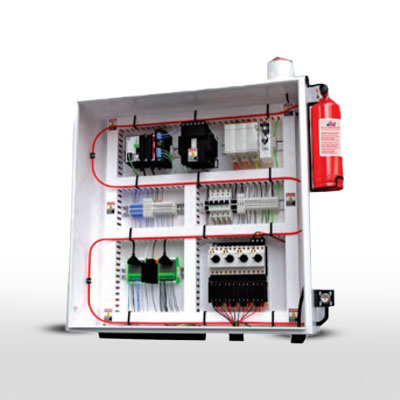Fire Tube Suppression System
Functionality:
- The system uses a network of flexible, heat-sensitive tubes filled with a fire suppression agent.
- When a fire occurs, the heat from the fire causes the tube to burst at the hottest point, releasing the suppression agent directly onto the fire.
Features
-
Rapid Detection and Suppression:
- The tubes are highly sensitive to heat and burst quickly at the source of the fire, allowing for rapid detection and suppression.
-
Direct Application:
- The suppression agent is released directly onto the fire, ensuring effective and immediate fire control.
-
Minimal Residue:
- Typically uses clean agents (such as FM-200, CO2, or dry powder) that leave little to no residue, reducing cleanup efforts and damage to equipment.
-
Flexible Installation:
- The tubes can be installed in a variety of configurations to protect different types of equipment and spaces, including enclosed cabinets, engine compartments, and electrical panels.
-
No Electrical Power Needed:
- Operates mechanically without the need for electrical power, making it reliable even in power outage situations.
-
Low Maintenance:
- Simple design with few moving parts, resulting in lower maintenance requirements compared to traditional fire suppression systems.
Applications
-
Electrical Cabinets:
- Protects sensitive electrical and electronic equipment from fire damage.
-
Vehicle Engine Compartments:
- Provides fire protection for engines in vehicles such as buses, trucks, and construction equipment.
-
Industrial Machinery:
- Safeguards machinery and equipment in industrial settings from fire hazards.
-
Data Centers:
- Protects critical IT infrastructure and servers from fire.
-
Marine Applications:
- Suitable for use in engine rooms and other compartments on boats and ships.
Advantages
-
Localized Fire Suppression:
- Targets and suppresses fires directly at their source, minimizing damage and preventing fire spread.
-
Versatility:
- Can be used in a wide range of applications, from industrial to commercial and residential settings.
-
Cost-Effective:
- Typically more affordable to install and maintain compared to complex traditional fire suppression systems.
-
Reliable Operation:
- Mechanical operation ensures the system functions effectively without reliance on power or complex electronics.
Key Components
-
Detection Tube:
- A flexible, pressurized tube that detects heat and bursts to release the suppression agent.
-
Suppression Agent:
- Can include various agents such as clean agents (FM-200, Novec 1230), CO2, or dry powder, depending on the application and type of fire risk.
-
Cylinder and Valve Assembly:
- Contains the suppression agent and controls the release when the tube bursts.
Maintenance
-
Regular Inspections:
- Regular visual and pressure inspections are recommended to ensure the system is in working condition.
-
Agent Refill:
- After discharge, the suppression agent needs to be refilled, and the detection tube replaced.
-
Testing:
- Periodic testing of the system to ensure proper functionality and compliance with safety standards.
Installation
-
Customizable:
- Installation can be tailored to specific needs and configurations of the equipment or space being protected.
-
Professional Services:
- Professional installation services ensure the system is correctly installed and operates effectively.
Safety and Compliance
-
Standards:
- Designed to meet or exceed relevant safety standards and regulations for fire suppression systems.
-
Training:
- Users and maintenance personnel should be trained in the operation and maintenance of the system.
The Fire Tube Suppression System is a highly effective, versatile, and reliable solution for fire protection, suitable for a wide range of applications from industrial machinery to data centers and vehicles.



Get quotation for this product